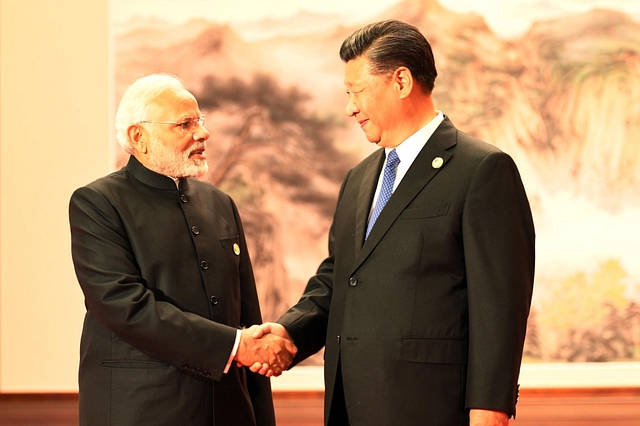
What Modi Should Whisper In Xi’s Ears: “You Have Shot Yourself In The Foot Over J&K”
India must sit tight and has nothing to fear from Chinese internationalisation of the J&K issue.
Even if China thinks it can embarrass India by going back to UN resolutions in 1948, we should bring Aksai Chin and the territories ceded by Pakistan into the argument.
There has been some hand-wringing among Indian writers on diplomatic issues that India has effectively “internationalised” the Jammu and Kashmir issue by abrogating Article 370 (read here, here). This is a load of bull, for J&K was internationalised in 1948, when Jawaharlal Nehru took the issue to the United Nations. That it has since lost much of its meaning owes more to the international community wearying of the issue than any proactive moves by India.
This time around, the “internationalisation” of J&K has more to do with China than Pakistan. It was China which took the issue to the UN Security Council for its own reasons, and not because it is a bum-chum of ‘Terroristan’.
Yesterday (9 October), a joint statement issued after a meeting between Pakistan Prime Minister Imran Khan and China’s 'dictator-in-chief’ Xi Jinping, had this to say: “The Kashmir issue, being a dispute left from history, should be properly and peacefully resolved based on the UN charter, relevant UNSC resolutions and bilateral pacts.”
Xi himself is quoted as saying: “The rights and wrongs of the situation in Kashmir are clear. China supports Pakistan in safeguarding its legitimate rights and interests and hopes the parties concerned can resolve the dispute through peaceful dialogue.”
If you read the two statements together, one must ask why in the first one China wants to internationalise the issue, while in the second it talks about safeguarding Pakistani interests. In the first statement, China mentions bilateral pacts only in passing; in the second, it talks only of bilateral pacts.
This implies that one statement was meant for Pakistani ears, and the second is its real position – that J&K is for India and Pakistan to resolve.
The bigger question: why has China gone ballistic on J&K even though nothing has changed on the ground after Article 370?
There are three points worth making:
First, more than Pakistan, it is China which has been disturbed by the change in J&K’s status where the entire Indian Constitution now applies to the state, now reduced to a Union Territory. As an illegal squatter on Indian territory, which includes both the territory it grabbed in the 1962 war (Aksai Chin), and the territory that Pakistan ceded to it under a 1963 boundary demarcation agreement, the extension of the Indian Constitution to J&K effectively makes China a party to the dispute. China can no longer pretend that J&K is about two other parties, with Kashmiris being a silent third party at best. Now a fourth party has been quietly added: China.
Second, China would like to see J&K remain an India-Pakistan problem, sure in the knowledge that if the dispute ever gets settled, it can count on Pakistan to preserve the 1963 agreement. But, as a Time magazine story in 1963 pointed out, the Pakistan-China territorial deal effectively diminished any chance of a bilateral settlement between Pakistan and India.
Third, the abrogation of Article 370 that makes J&K a regular Indian Union Territory, puts China in an awkward place. If it goes along with its current stand, that J&K must be resolved both bilaterally and as per UNSC resolutions, it implies that the part of J&K occupied by China will also get internationalised.
What one should read in the recent Chinese belligerence over J&K is that it did not expect itself to be brought to the centre of the dispute – either directly or indirectly. Its duplicity can now be exposed by India in Western capitals simply: if India has to follow UN resolutions on J&K, which calls for a plebiscite after foreign troops are withdrawn (which means Pakistani’s withdrawal from PoK and Chinese withdrawal from the parts ceded by Pakistan to it), the UN resolution will not leave China untouched.
Since Maharaja Hari Singh signed up the whole of J&K for accession to India – and in 1948 that included both Aksai Chin and the parts of Gilgit Baltistan ceded by Pakistan to China in 1963 – it will mean going back to the status quo as in 1948. It does not mean the status quo created after the 1962 war and the 1963 agreement between China and Pakistan.
China has thus made a huge strategic blunder, for it will be the last one to believe that the status quo must be changed now. If anything, it wants the status quo changed in its favour, with India ceding more territory in Ladakh and Arunachal Pradesh. That ain’t going to happen.
Effectively, the Chinese bid to internationalise J&K has also internationalised its own occupation of parts of it.
When Prime Minister Narendra Modi meets Xi Jinping in Mamallapuram near Chennai tomorrow (11 October), he should whisper these facts into Chinese ears.
India must sit tight and has nothing to fear from Chinese internationalisation of the J&K issue. Even if China thinks it can embarrass India by going back to UN resolutions in 1948, we should bring Aksai Chin and the territories ceded by Pakistan into the argument. We should call China’s bluff on J&K, for the world is not about to send an army to oust India from J&K. Only minor powers – like a Sudan or a Serbia – need to worry about internationalisation. We don’t.
It is obvious that China wants the status quo to continue in J&K. The words it spoke when Imran Khan met Xi Jinping were meant only for Khan’s ears. We should make due diplomatic noises about it, while keeping the powder dry for any Chinese attempt to make incursions into Indian territory.